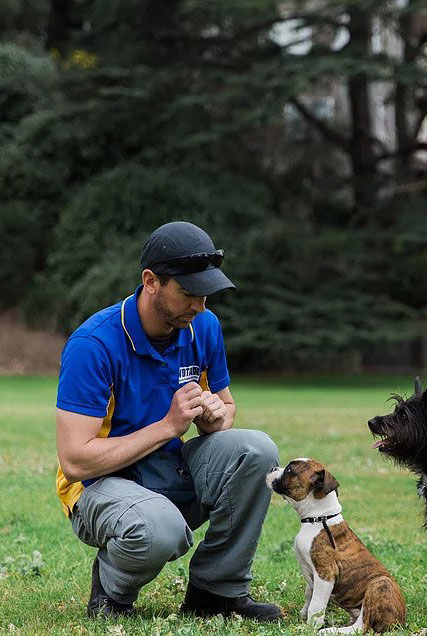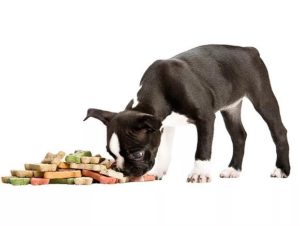Puppy Training
In the dog training world there is nothing more important and more satisfying that giving a puppy the right foundations to reach it’s full potential, and with the amount of scientific research completed on puppy development we understand exactly what they need and the best ways to deliver it. Without the right skills and knowledge regarding puppy training, the resulting deficiencies are considerably noticeable in the adult dog.
But the practical side of rearing a puppy correctly can be quite difficult, a squirming distracted pup is hard to keep engaged during training and it is a great skill to be able to successfully work puppies the right way. It is important to direct them in to activities that are stimulating and beneficial to their development rather than allowing them to constantly please themselves as so many tend to do.
Engagement
Our pet dogs are companion animals; or rather they are supposed to be. But how often when you take your dog away from the house does it completely ignore you and proceed to follow scents, wander or even chase other dogs or people. While this is normal canine behaviour it should occur on your terms rather than the dogs terms. A companion dog is supposed to be responsive to the handler, this is imperative for the safety of the dog and other people. A dog chasing something across the road not under effective control can cause catastrophic amounts of damage or injury, it is law that all dogs must be under effective control at all times. To achieve this you must promote engagement from the day the puppy comes home, teach the puppy to look at you and that to do so is rewarding. You must be fun and interesting to the dog, working out things he finds reinforcing and using those things to keep him focussed on you. Walking around sniffing and exploring, while important, should be secondary to playing a game with the owner.
Socialisation
This term is very loosely applied to the act of a puppy interacting with things that it will possibly come into contact with during the course of its life: Smells, objects, wildlife, dogs, people, machinery, everything you can think of. Done right it can set the pup up for a life of endless possibilities. However, done incorrectly, it will only result in a life of trouble and exclusions for the poor dog.
All puppies go through critical periods of development, and these periods are extremely important because extensive scientific studies have proven that significant events that occur during these periods can leave an indelible imprint on the dog’s temperament. In short almost everything they know about the world they learned during these critical periods. Although training behaviours like obedience and tricks can be done outside these periods, the dog’s speed of acquisition will improve dramatically if these things are started during the critical period.
The main critical period starts before you even get the puppy (3 weeks, which is why choosing the right breeder is so important) and finishes around 16 weeks of age. That means you have approximately 8 weeks to set the puppy up for a successful life.
So where does it go wrong? People think that socialisation is simply exposing a dog to a particular stimulus, (cars, trucks, noise, other dogs, people etc) and letting it take it in and absorb information. But what this achieves is to teach the dog to ignore the handler and go out on its own; it learns to forget about you and is immersed in its own world. To build a successful relationship between dog and handler you have to create a feeling of camaraderie to show the dog that “we are in this together.”
Every now and then during socialisation, you teach your dog to come back to you to check-in. This ensures that as the dog grows up you are always in his bubble, always thought of, never ignored. Some trainers refer to this as a “Neutral Socialisation”. It works fantastically in that the pup learns not to be afraid of anything and to be calm and confident in novel environments, but the dog also learns that its handler is more fun than anything it will come across out there and so remains responsive.
These techniques are utilised by professional organisations all over the world such as Law Enforcement and Government Agencies.

Puppy School
When learning new behaviours for the first time, dogs require a low distraction environment to acquire the skill without fault. This means a quiet place with nothing around to take the dogs interest, no unusual smells, no toys on the floor, no loud noises and certainly NO DOGS. Taking your dog to puppy school is a bad idea, all it teaches the dog is that they can ignore you and that constant efforts to get to other dogs will be rewarded eventually when it comes time for the free for all play session at the end of the class in the name of “socialisation”. This is an example of socialisation done poorly. It also teaches the dog that every time it sees other dogs that it’s ok to jump all over them and go crazy, this is not alright at all and can lead to problem behaviours in the future such as aggression or timidity. Trying to get the pup to sit or lay down on command during these classes is the equivalent to doing algebra in a nightclub. Not ideal as it sets you and the dog up for failure down the track.
Contrary to what a lot of new puppy owners are told, it is not essential for a puppy to be extensively socialised with other puppies during its critical period. Since it opened its eyes your dog has had 4-6 weeks of socialisation with its littermates, so unless your particular dog came from a litter with 1 or 2 other pups and displays a prominent deficiency in that area, there is no need for extra socialisation with other Pups.
It is important however for your puppy to be socialised in a structured fashion with calm, safe adult dogs of different breeds, this is how we do it at the Victorian Dog Training Academy and the results are vastly superior. Your dog will pick up good behaviours from the adult dog, it will be told when it is being too rambunctious, yet it will feel safe enough to investigate and learn about the dogs in its presence. We can also give you first hand knowledge of the types of dogs that you should continue your socialisation program with, to ensure the prevention of bad experiences and irreversible fears.
Board and Train During the Critical Period of Development
We offer expert training and socialisation for your puppy during its critical period up to 16 weeks of age. Your pup stays in a home environment and is brought out for consultations to meet adult dogs of all shapes and sizes, meet people, and be exposed to all the sights sounds and smells of the world in order to prepare it for life and give it the best possible start. This is type of socialisation and habituation is impossible to replicate yourself due to the number of dogs the VDTA has access to. Your puppy will be toilet trained and will have strong foundations in obedience behaviours sit, down, stay and recall. For those that truly want the best for their dog, this service is a must have.



